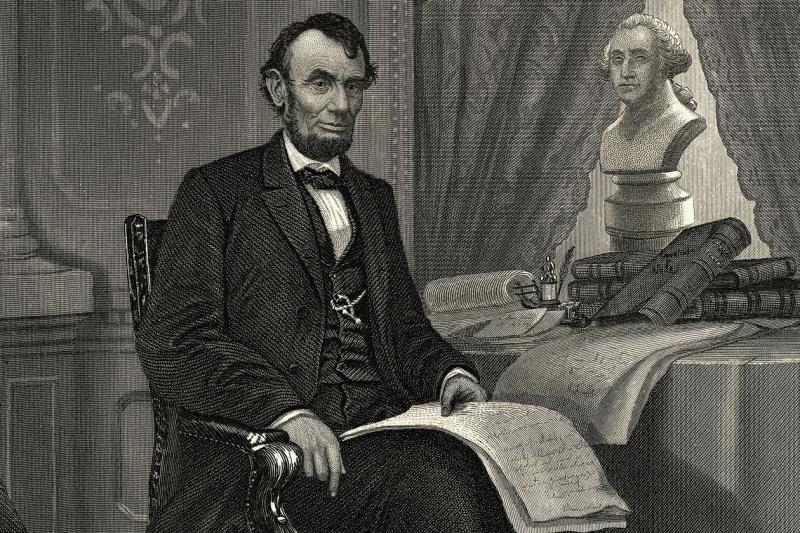'Lincoln in Private' Review: Confidential Ruminations
By: Andrew F. Lang (WSJ)



Abraham Lincoln stands among the foremost lyricists of the American experience. His first inaugural address called on a divided citizenry's "better angels" to uphold the sacred inviolability of the Union. His Gettysburg Address envisioned a nation baptized by the blood of battle into "a new birth of freedom." And his second inaugural meditated on a just God chastening a republic of liberty that tolerated slavery.
How did Lincoln arrive at these arresting ideas and phrases? As far as we know, he didn't leave a personal diary to posterity. But he did bequeath 109 surviving fragments or notes that feature what he called his "best" (though often "disconnected") thoughts. In scrawled penmanship, Lincoln explored a range of subjects: the mysteries of nature, a lawyer's public reputation, the immorality of slavery, the active role of God in human affairs. These notes—some no more than a few sentences, others multiple paragraphs—were not, according to Lincoln's personal secretaries, John Nicolay and John Hay, "written to be seen by men."
Lincoln's confidential ruminations are the subject of Ronald C. White's "Lincoln in Private," an intimate character portrait and fascinating inquiry into the basis of Lincoln's energetic, curious mind. Mr. White, whose masterly biography of Lincoln appeared in 2009, regards Lincoln's notes as the "building blocks" of his political philosophy and of his sense of self. "The function of Lincoln's fragments"—all of which are reprinted in the book—"is for him to write in private what he may not yet be willing to say in public."
Lincoln cherished careful, authoritative rhetoric. He used his private jottings to confront problems, establish propositions, exercise the limits of his arguments and anticipate critics' rejoinders—all before announcing his public positions. He wrote to himself as both a meditative thinker and as a careful practitioner who searched for the precise word or phrase and who often set rigid standards for himself. The "leading rule" for all aspiring professionals, the lawyer Lincoln recorded in 1850, "is diligence. Leave nothing for tomorrow which can be done today." To fulfill an ambitious life was "to be honest at all events." We see in Lincoln's fragments a poised and resolute intellectual. We also see a vulnerable individual humbled by the precariousness of the nation and of its vast, uncertain future.
Lincoln in Private
By Ronald C. White
Random House, 328 pages, $28
When Illinois Sen. Stephen A. Douglas's 1854 Kansas-Nebraska Act granted citizens the right to decide for themselves the fate of slavery in the western territories, Lincoln retreated to his private thoughts to work through the inconsistencies of Douglas's "popular sovereignty." "If A. can prove, however conclusively, that he may, of right, enslave B.," Lincoln wrote to himself, "why may not B. snatch the same argument, and prove equally, that he may enslave A.?" Put another way, was democracy moral when a political majority curtailed the natural rights of another people who themselves were deprived of electoral consent? Lincoln's resounding "no" to this question informed his Peoria speech (1854) and his debates with Douglas in 1858, fueling his rise in the Republican Party.
Lincoln regarded slavery as a moral abomination. It affronted the individual right to liberty and destabilized the world's lone federal republic. The Union "cannot endure permanently half slave and half free," Lincoln scribbled in his notes several weeks before voicing that phrase in his 1858 "House Divided" speech. Mr. White says that Lincoln treated his personal inscriptions "as a private pressure valve so that he could better use his persuasive combination of calm logic and humor to make the case against slavery."
Lincoln believed that slavery couldn't expand across a nation defined by the spirit of the Declaration of Independence, with its emphasis on natural human equality. Individual liberty sustained by individual enslavement, he believed, was democratic despotism. "As I would not be a slave, so I would not be a master," he wrote privately in 1858. "This expresses my idea of democracy. Whatever differs from this, to the extent of the differences, is no democracy."
In January 1861, as president-elect, he wrote in his notes that the Declaration, "which has proved an 'apple of gold' to us," didn't reserve its logic only for white men. Slavery and mastery were both antithetical to liberty itself, "the principle that clears the path for all—gives hope to all—and, by consequence, enterprize, and industry to all." Thus everyone was entitled to the natural rights showcased in the Declaration. He likened the Constitution and the Union to a "picture of silver," one that had been composed to "adorn" and "preserve" the Declaration's apple of gold. "The picture was made for the apple—not the apple for the picture."
As Lincoln traveled to Washington for his inauguration, seven slave-holding Southern states had already seceded from the Union. In remarks delivered at Independence Hall in Philadelphia, he seemed to translate his private thoughts on the "apple of gold" and "picture of silver" into a public condemnation of disunion. Secession in the name of slavery, he declared, jeopardized "that sentiment in the Declaration of Independence which gave liberty, not alone to the people of this country, but, I hope, to the world, for all future time. It was that which gave promise that in due time the weight would be lifted from the shoulders of all men."
To tolerate disunion erased the inalienable promise of the nation's founding. Thus, by December 1862, amid a terrible civil war, Lincoln argued that emancipation was essential to the Union's preservation. In echoes of his 1858 fragment on slavery, mastery and democracy, and his 1861 note on the Constitution and Union, Lincoln announced in his annual message to Congress: "In giving freedom to the slave we assure freedom to the free—honorable alike in what we give and what we preserve. We shall nobly save or meanly lose the last, best hope of earth." As Mr. White shows so persuasively, Lincoln's quiet, personal moments laid the foundation for his enduring public legacy.
Mr. Lang is a professor of history at Mississippi State University and the author of "A Contest of Civilizations: Exposing the Crisis of American Exceptionalism in the Civil War Era."

Tags
Who is online
36 visitors


In everything I have ever read about Lincoln, it is clear that he was a master politician who calculated every move as President. One could say one of the greatest men that ever lived. It is no wonder that so many books have been written about him.
The Book is
LINCOLN IN PRIVATE
By Ronald C. White
Random House, 328 pages
Coming next year ...
[DELETED]